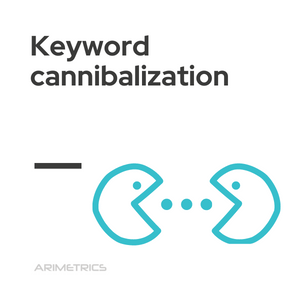 Definition:
Definition:
Keyword cannibalization is a search engine optimization (SEO) phenomenon in which several pages of the same website compete for the same key phrase or phrases. This competition can result in lower rankings, as each page cannibalizes the ranking power of the other. Occurs when multiple web pages contain and attempt to target the same exact keyword or key phrase.
Origin of the term cannibalization
The term keyword cannibalization was first used in 2013 by SEO expert Bill Slawski in an article he wrote for the Search Engine Land blog. The concept had been discussed and debated in various search engine optimization forums before, but had not been given a name until Mr. Slawski coined bliss. sentence
In his article, Mr. Slawski noted that cannibalization can occur in different ways: it can be unintentional, such as when a website initially targets a keyword and later adds new web pages with similar or duplicate content that target the same keyword; Or it can be intentional, such as when multiple web pages of a site are explicitly created to target the same keyword phrase.
Examples of keyword cannibalization
Examples of keyword cannibalization can be found when multiple web pages of a website have been created with the same goal. For example, if a fashion retailer creates two different websites to rank for the keyword “women’s dresses,” both pages will cannibalize the other’s positioning potential. This is because both have similar content and compete for the same key phrase.
Another example of keyword cannibalization is when a website has multiple web pages competing for the same key phrase. For example, if a website has two distinct blog posts targeting the same key phrase, such as “DIY Home Improvement Projects,” then both pages will cannibalize each other’s ranking potential. This is because they have similar content and are both competing for the same key phrase.
How to detect keyword cannibalization
To detect keyword cannibalization, you can do the following:
- Use a keyword analysis tool to review the keywords you’re optimizing your website for.
- Review pages and posts to see if they’re optimized for the same keywords.
- Use a web traffic analysis tool to see what keywords are driving traffic to your site and how each page is performing in search results for those keywords.
- Use a keyword monitoring tool to see if there are any particular keywords that are driving traffic to multiple pages rather than just one.
Once the keyword cannibalization is identified, steps can be taken to fix the problem, such as optimizing the page you want to perform the most for that keyword or removing or merging pages that are competing with each other.
How to avoid keyword cannibalization
To avoid cannibalization in SEO efforts, it’s important to carefully consider the keywords and phrases you use on each page of your site. For example, a blog post on how to eat healthy foods may want to target different keywords, such as “low-calorie recipes” or “healthy snack ideas.” This will ensure that the content is optimized more effectively for individual keywords and phrases, while avoiding cannibalization. In addition, the use of synonyms or closely related terms can also be considered to avoid cannibalization.
